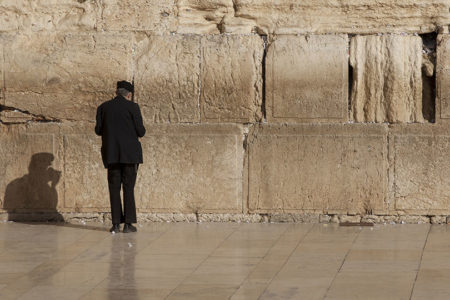Paul’s Ministry Confirmed Galatians 2:1–10
Opposition to Paul and his ministry was vicious. Judaizers had sown seeds of contention throughout Galatia. They had questioned Paul’s commission as an apostle, compromised the gospel by mixing law and grace, and corrupted local churches with their legalistic preaching. The churches that Paul had established were confused and in desperate need of direction if they were to survive.
The apostle went up to Jerusalem to counter the opposition of the Judaizers. He hoped that his meeting with the other apostles would result in (1) approval of his apostolic authority among the churches, (2) acceptance of his gospel to the Gentiles, and (3) agreement between himself and the other apostles on doctrine and practice.
Paul rehearsed the results of his meeting in Jerusalem in order to establish once and for all his apostolic authority among the churches in Galatia.
Apostles Consulted
Paul returned to Jerusalem 14 years after a previous visit, this time with Barnabas and Titus (v. 1). Most likely this was not the visit made three years after his conversion (1:18) plus 14 years, but the visit that took place 14 years after his conversion. Scholars differ on whether this was the famine relief visit from Antioch (Acts 11:27–30) or the visit made during the first church council in Jerusalem around 49 A.D. (Acts 15:1–35). Evidence seems to favor the famine visit from Antioch.
The apostle “went up by revelation” (v. 2), not at the request of any church leader, to confer with the apostles in Jerusalem. How the revelation came to Paul is not mentioned. Some scholars believe it came through Agabus (Acts 11:28), who inspired Paul’s famine visit to Jerusalem.
Paul felt no obligation to receive approval for his gospel from the apostles in Jerusalem. He had received that 14 years earlier when Christ revealed the gospel to him. But he wanted to show the church leadership that his gospel to the Gentiles did not require them to be circumcised or keep any form of the Mosaic Law in order to be saved.
If the Jerusalem leadership had rejected Paul’s gospel, he would have felt like an athlete who had exerted great effort to train for and win a race, only to learn that he “had run, in vain” (v. 2)—that is, to have implemented his ministry among the Gentiles only to have it rejected by the church. But in the apostle’s mind, that was not the case. In fact, Paul would have run in vain had he compromised his gospel to include the legalism preached by the Judaizers.
Disapproval by the Jerusalem church would not have invalidated the apostle’s ministry, but subdivision would have created a serious schism between the Jews and Gentiles and the apostles, thus hindering the proclamation of the gospel. Later in this chapter we are told that the apostles did approve of Paul’s ministry to the Gentiles.
Paul brought Titus to Jerusalem as a test case to refute the rite of circumcision being propagated by the Judaizers. He said, “neither Titus, who was with me, being a Greek, was compelled to be circumcised” (v. 3). In other words, Titus, a Gentile and a true believer, provided irrefutable proof that it was unnecessary for Gentile Christians to keep the Mosaic Law in order to be saved. Requiring Titus to be circumcised would have been tantamount to denying justification by grace through faith apart from the Law.
The later decision by the Jerusalem council not to require Gentile believers to be circumcised sustained Paul’s position (Acts 15). Thus, the apostle successfully defended his position of salvation by grace apart from any legalistic requirements put forth by the Judaizers.
Apostates Confronted
Those who would have compelled Titus to be circumcised were labeled by Paul as “false brethren” (v. 4). Although it is not stated, the false brethren were probably Judaizers who taught, “Except ye be circumcised after the manner of Moses, ye cannot be saved” (Acts 15:1).
These men were secretly brought into the church “unawares” (v. 4). The picture given is of spies who infiltrate the enemy’s camp for the purpose of subterfuge and sabotage (cp. 2 Pet. 2:1; Jude 4). Their motive was twofold: First, surveillance—“to spy out” the “liberty” that the apostles had “in Christ Jesus” (v. 4). This liberty freed the apostles from the Mosaic Law with its external ceremonies and ritualism. The basis for their freedom was “in Christ Jesus,” whose sacrificial death redeemed man from the curse of the Law (3:3; 4:5). Second, to make slaves of the Christians, or “bring [them] into bondage” (v. 4). The word bondage has the idea of reducing to abject slavery. The Judaizers wanted to bring Paul and his followers into bondage—first to themselves and then to the Mosaic Law, which would eventually have caused Gentile believers to live a Torah-centered lifestyle and forced a return to enslavement under the Law, from which believers had been liberated (3:23–4:11).
Paul and his party did not submit to the Judaizers’ demands. He said, “To whom we gave place by subjection, no, not for an hour” (v. 5). Not for one moment would they succumb to the subversive demands of the Judaizers.
What was the reason for taking such a strong stand? “That the truth of the gospel might continue with [for] you” (v. 5)—in other words, so that there would be no compromise for the truth found in the gospel, both for the Galatians and for all Christians who would follow.
Several practical lessons can be gleaned from Paul’s teaching. First, the Jerusalem church agreed that the Gentiles did not have to keep the Law or become Jews to possess salvation (Acts 15:13–21). Second, false brethren and doctrinal error should be dealt with immediately; they should not be allowed to exist in the church. Third, Christians must realize that while Christ has liberated them from the Law, this does not give them license to live as they please. Believers are still under the “law of Christ” (6:2). Fourth, Scripture makes it clear that believers should not give heed to false teachers (Eph. 4:14) or their teachings (2 Tim. 4:3–4; Jude 3–4). Those who succumb to such charlatans are partakers of their evil deeds (2 Jn. 10–11). This is fair warning to Christians who listen to TV preachers who are in doctrinal error. Christians should not give them one moment of their time.
Authority of Colleagues
Once again, Paul focused on his relationship with the leaders in the Jerusalem church. He acknowledged that “James, Cephas, and John … seemed to be pillars” in the church (v. 9). But he also said that “they who seemed to be somewhat in conference added nothing to me” (v. 6). That is, the leadership of the church at Jerusalem did not cause Paul to alter his gospel message to the Gentiles.
It may appear that Paul spoke abusively about the apostolic leadership in Jerusalem, but such was not the case. He was not being disrespectful to them when he said, “whatever they were, it maketh no matter to me” (v. 6). He was merely emphasizing that his authority as an apostle stood independent of those in Jerusalem.
The Lord does not receive people on the basis of appearance: “God accepteth no man’s person” (v. 6). Their position in the church did not matter to Paul, for God does not show partiality to men based on leadership or position. The apostle was on the same level as the Jerusalem leadership, for, like them, he had been chosen, called, and commissioned by Christ personally. Therefore, these men did not add anything to Paul concerning revelation from the Lord. In other words, the Jerusalem apostles imposed on Paul no burden of doctrine or practice and imparted to him nothing in addition to what he already knew.
Apostolic Confirmation
“On the contrary,” the apostles received Paul “when they saw that the gospel of the uncircumcision was committed unto” him (v. 7). The word committed implies that he was entrusted with a permanent commission to herald the gospel to the Gentiles, “as the gospel of the circumcision was unto Peter” (v. 7). His acceptance by the Jerusalem apostles forever laid to rest the Judaizers’ claim that he preached another gospel. In fact, Paul was appointed by the Jerusalem council to take this decision—salvation is by grace apart from any work of the Law—to churches in Antioch, Syria, and Cilicia (Acts 15:22–24). It was in those places that the Judaizers had done their greatest damage.
The reader must guard against the assumption that verse 7 refers to two different gospels. Paul and the other apostles were in doctrinal unity concerning the content of their gospel (1:6–9), but they employed different missionary strategies in their respective ministries.
The relationship of Paul’s commission to the Gentiles and Peter’s to the Jews is confirmed by the parenthetical note in verse 8, where the word he refers to the enabling power of the Holy Spirit, who commissioned and blessed the ministry of both apostles.
Paul’s ministry was formally recognized by “James, Cephas, and John,” who extended to him and his party “the right hands of fellowship” (v. 9). This enthusiastic endorsement provided unity within the church and brought sanctions against the Judaizers’ position. The Jerusalem apostles did not go only to the Jews, nor did Paul go only to the Gentiles. Scripture teaches that Peter and Paul had overlapping ministries to both Jews and Gentiles (Acts 10:34–48; 13:5, 14ff 14:1; 16:13, 16; 17:1, 10; 18:4, 19; 19:8).
A number of applications can be made regarding the relationship between the apostles. First, when contention among church leaders arises, it must be talked out in an attitude of prayer, allowing the Holy Spirit to direct whatever decisions are made. Second, there can be diverse ministries that complement each other within a fellowship, and they should be acknowledged, provided that the gospel is not compromised. Third, a spirit of competition should not be tolerated within church ministries. Fourth, there should be total cooperation in ministry among men of like faith.
Only one request was made of Paul and Barnabas by the Jerusalem church. They were asked to “remember the poor” (v. 10). This the apostles had done by bringing relief money from Antioch to suffering Judean believers experiencing a famine (Acts 11:29–30). Most likely poverty was rampant throughout the communities of both Jewish and Gentile believers because of discrimination and persecution. Paul was willing not only to comply with the request but to be “diligent” (v. 10)—that is, eager to honor such requests throughout his ministry (Rom. 15:25–26; 1 Cor. 16:1–4; 2 Cor. 8:1–6; 9:1–5, 12).
Several practical principles emerged during the confirmation of Paul’s ministry that should be implemented in churches today. First, the church must ensure that a doctrinally sound gospel is being preached and taught within the fellowship. It must not proclaim a mixture of law and grace. Second, the church must guard against false brethren who creep into the fellowship and cause division with their heretical or legalistic teachings. Third, church leaders—be they pastors or deacons—must seek spiritual discernment and wisdom to deal with the aforementioned problems. Fourth, we must remember that although the apostles were in doctrinal unity, they could differ on the presentation of their ministry to various groups without causing strife or division.
The bond of brotherly fellowship is important in the work of Christ. David captured its beauty and blessing when he wrote, “Behold, how good and how pleasant it is for brethren to dwell together in unity!” (Ps. 133:1). May we, like the early church, continue steadfastly in the apostles’ doctrine and brotherly fellowship as we proclaim the message of salvation by grace through faith to a lost world. This kind of brotherly unity and love will confirm our ministry and attract men to Christ.








